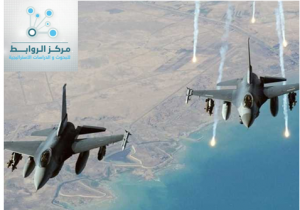After the Iranian Revolutionary Guard shot down a US drone, whether it was shot down in Iranian airspace or over the high seas, the US media “CNN “, “the New York Times” and ” the Washington Post” reported that US President Donald Trump had agreed on a plan to strike Iranian targets. The media then reported that Trump had retreated at the last moment from the strike after receiving a lengthy phone call from Israeli Prime Minister Benjamin Netanyahu. What was reported by the media about the retreat from the strike is merely media consumption inside and outside the United States.
Given the importance of dropping the American aircraft and the US response to it, Rawabet Center for Strategic Studies and Research, believes that there was no US strike on Iranian targets and that Trump did not need to be contacted by Netanyahu to back down from his decision. There are several indications of the correctness of the political analysis of the Rawabet Center: First: that the US administration did not ask members of the US diplomatic mission in Baghdad to leave Iraq, nor did it ask its armed forces to raise the degree of alert to the fullest extent. Second, the US administration has not informed its closest allies at the international, regional and Arab levels that Washington intends to launch a military strike deep inside Iran. It can be seen that Washington’s allies in Iraq did not ask its diplomatic missions in Baghdad to leave Iraq. Any decision by the United States to target Iran militarily without the knowledge of its allies will make them vulnerable to Iranian targeting in Iraq. Washington must therefore inform its allies of such a dangerous decision. This is not happened. Therefore, these accurate indicators undermine all American and other media reports that there is an American intention to respond to Iran.
There are lobbies competing in the White House in the way it should be dealt with Iran, especially after the Revolutionary Guards target the American reconnaissance aircraft (drone). The first is the powerful lobby led by National Security Adviser John Bolton, who considers it necessary to pursue a very firm policy with Tehran such as to use the military force to deter it . The second is less present in the American administration than the first lobby, which can be called the rational lobby, which calls for relying on diplomatic tools in dealing with Iran and neutralizing the military option as much as possible because of its consequences that may be painful not only on the American administration, but the United States of America as well.
At the moment, the second lobby has won the first in the White House in the sense that there is no intention to strike or military strikes against Iran, but as the saying goes, “patience has its limits” meaning that Tehran should not continue to do actions that would provoke Washington, this time – Washington absorbed the downing of its aircraft by Tehran. But next time it may not be able to accept any new Iranian aggression, Tehran’s repeated provocation to Washington may open the door to possibilities and it could result in unforeseen dire consequences and never end well .
There may be other factors delaying or to postpone the American strike on Iran, including the Israeli elections in September and the US elections in November 2020. Netanyahu and Trump seem not to want any unpleasant surprises in the event of a war with Iran that may affect political future.
The Iranian state was on high alert for any American reaction. On the Iranian level, the Iranian state was on alert to the highest extent to confront any US response, the Iranian state, both the Revolutionary Guards and the parallel state, strongly defended the targeting of the American aircraft. The decision to target it was not a “stupid” decision, as Trump claimed but it was an accurate and very careful decision. There is no doubt that the Iranian targeting will have the American response to it economically so perhaps the Iranian state decided at the highest levels to adapt to the US sanctions, which reach the level of economic blockade.
On the Iraqi level : yesterday night was the longest and probably the most difficult night for Iraq after 2003, Iraq has lived a state of anticipation of the situation after the Iranian targeting of the American aircraft, because in the event of a war between Washington and Tehran, the geography of Iraq will be the main arena of that war .
In summary, Iran’s behavior, based on provoking the United States, is matched by an escalating American strategy that has three dimensions to respond: to isolate Iran diplomatically at the international level, economic sanctions to the level of economic blockade, and US military buildup in the Arabian Gulf.
Iranian Studies Unit
Rawabet Center for Research and Strategic Studies

